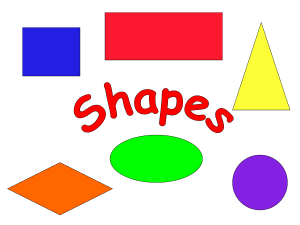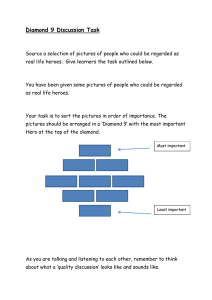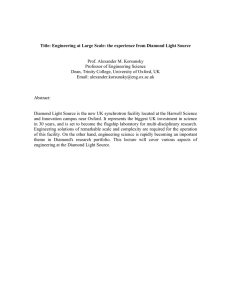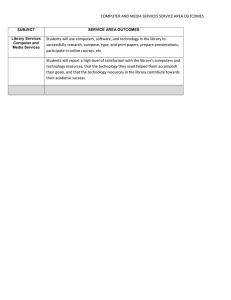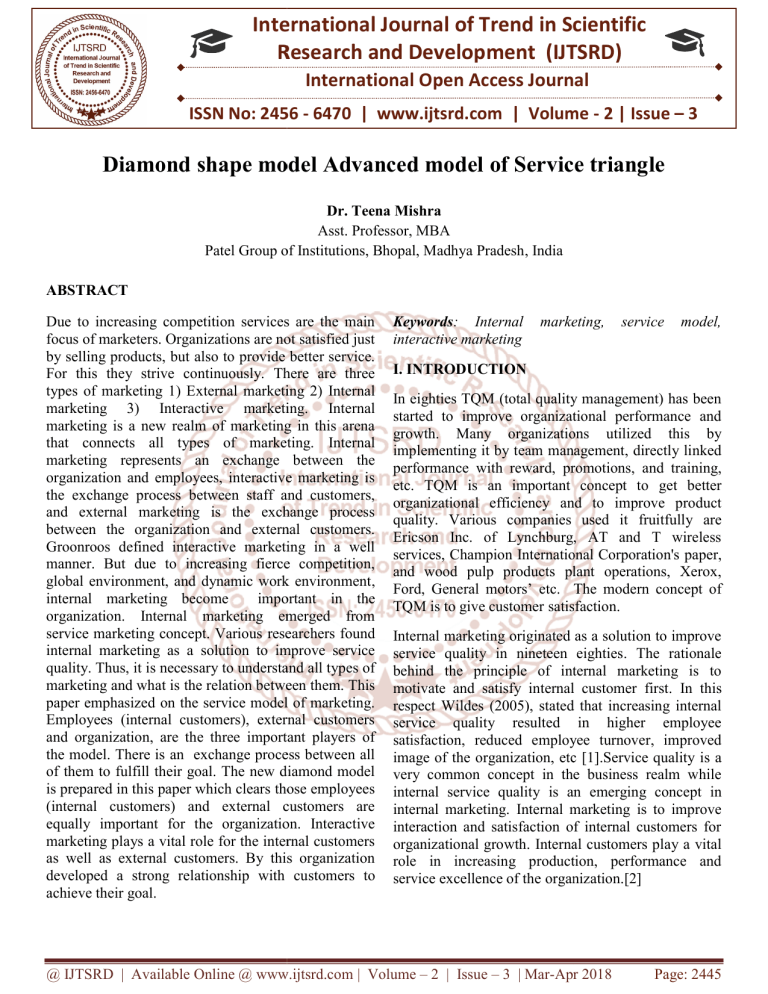
International Journal of Trend in Scientific Research and Development (IJTSRD) International Open Access Journal ISSN No: 2456 - 6470 | www.ijtsrd.com | Volume - 2 | Issue – 3 Diamond shape model Advanced model of Service triangle Dr. Teena Mishra Asst. Professor, MBA Patel Group roup of Institutions, Bhopal, Madhya Pradesh Pradesh, India ABSTRACT Due to increasing competition services are the main focus of marketers. Organizations are not satisfied just by selling products, but also to provide better service. For this they strive continuously. There are three types of marketing 1) External marketing 2) Internal marketing 3) Interactive marketing. Internal marketing is a new realm of marketing in this arena that connects all types of marketing. Internal marketing represents an exchange between the organization and employees, interactive marketing is the exchange process between staff and customers, and external marketing is the exchange process between the organization and external customers. Groonroos defined interactive ctive marketing in a well manner. But due to increasing fierce competition, global environment, and dynamic work environment environment, internal marketing become important in the organization. Internal marketing emerged from service marketing concept. Various resea researchers found internal marketing as a solution to improve service quality. Thus, it is necessary to understand all types of marketing and what is the relation between them. This paper emphasized on the service model of marketing. Employees (internal customers), external customers and organization, are the three important players of the model. There is an exchange process between all of them to fulfill their goal. The new diamond model is prepared in this paper which clears those eemployees (internal customers) and external customers are equally important for the organization. Interactive marketing plays a vital role for the internal customers as well as external customers. By this organization developed a strong relationship with cu customers to achieve their goal. Keywords: Internal interactive marketing marketing, service model, I. INTRODUCTION In eighties TQM (total quality management) has been started to improve organizational performance and growth. Many organizations utilized this by implementing it by team management, directly linked performance with reward, promotions, and training, etc. TQM is an important concept to get better organizational efficiency and to improve product quality. Various companies anies used it fruitfully are Ericson Inc. of Lynchburg, AT and T wireless services, Champion International Corporation's paper, and wood pulp products oducts plant operations, Xerox, Ford, General motors’ etc. The modern concept of TQM is to give customer satisfaction. satisf Internal marketing originated as a solution to improve service quality in nineteen eighties. eighties The rationale behind the principle of internal marketing is to motivate and satisfy internal customer first. In this respect Wildes (2005), stated d that increasing internal service quality resulted in higher employee satisfaction, reduced employee turnover, improved image of the organization, etc [1].Service quality is a very common concept in the business realm while internal nternal service quality is an emerging concept in internal marketing. Internal marketing is to improve interaction and satisfaction of internal customers for organizational growth. Internal nal customers play a vital role in increasing production, performance and service excellence of the organization.[2] organization. @ IJTSRD | Available Online @ www.ijtsrd.com | Volume – 2 | Issue – 3 | Mar-Apr Apr 2018 Page: 2445 International Journal of Trend in Scientific Research and Development (IJTSRD) ISSN: 2456-6470 II LITERATURE REVIEW A. Types of marketing Service marketing is a ‘game of promise’. In the service transaction, there are three types of marketing1) External Marketing- External marketing makes a promise to customers for giving benefits, satisfaction by way of advertising, public relation, exercises and others. 2) Internal Marketing-This marketing is for service providers. The organization provides equipment, computers, telephones working space to internal customers. They are employees, channel partners, and franchises. An organization has to recruit, train, motivate, to improve service quality. The focus is on motivation and satisfaction of employees to improve service quality. 3) Interactive Marketing- The providers interact with the customers. Provider plays an important role in making images of the organization. They satisfy external customers by keeping promises of their organization. [3] Fig. no. 1 shows three types of marketing:1) 2) 3) Enterprise does marketing with an external customer that is external marketing. Enterprise does marketing with a staff that is internal marketing. The staff does marketing with an external customer that is interactive marketing. With this service triangle model focus on the external customer is from two sides, one from enterprise side and second from the staff side. The focus of staff towards the external customer is to improve service quality. Fig.1 Service triangle Model Staff interacts with an external customer is called interactive marketing. Before doing interactive marketing, there is, need to do internal marketing first.[4] In figure 2., there are two sub-processes, which are focusing towards external customers. Both the subprocess occurs simultaneously towards external customers. B. Two sub-process of enterprise towards external customers 1) Sub-process 1-Enterprise starts internal marketing with staff and staff doing interactive marketing with external customers. 2) Sub-process 2-Enterprise starts external marketing with external customers. These above two sub-processes of this model focus towards external customers. Enterprise does two types of marketing that are internal marketing and external marketing. The staff does interactive marketing with external customers. The exchange process between enterprise and external customer is for mutual satisfaction. The staff isn’t suddenly jumping towards the external customers. For doing external marketing enterprise required staff to do interactive marketing. Therefore, the enterprise is working towards two directions for external customers. @ IJTSRD | Available Online @ www.ijtsrd.com | Volume – 2 | Issue – 3 | Mar-Apr 2018 Page: 2446 International Journal of Trend in Scientific Research and Development (IJTSRD) ISSN: 2456-6470 The new Diamond shape models shown in figure 2 create the importance of internal customers. Just as external customers have a need and desire to fulfill it in the same way internal customers also have the desire, need to satisfy it. C. Two sub model Fig. 2: New Diamond of service marketing This diamond service-marketing diagram indicates that interactive marketing is the need of not only for external customer but also for internal customers. Internal customers interact in the internal market place. Enterprise directly influences internal customers that are internal marketing and employees interact with each other that are interactive marketing. Figure 2. Internal marketing makes an influence on interactive marketing that happened between employees and customers, but we cannot say that internal marketing is only to improve interactive marketing and gives external customer satisfaction as depicted by Groonroos et al. In the model target of the enterprise towards external customers, whether using internal marketing or external marketing. The organization depends on staff and external customer for their success. External customer depends on staff and organization for their satisfaction and getting service. According to this model, internal marketing is only for improving interactive marketing between employees and customers. In the internal marketing concept, employees are treated as customers and jobs as products. [5]Thus, in the organization, there is an interaction between internal customers and staff. All of the employees act as internal customers and internal suppliers. Due to this, there is also need to improve interactive marketing in the organization between internal customers and staff. By this organization can improve the services of internal customers.[6] Due to this, there is a need for a new model. We need to look from the ‘triangular shape of service marketing’ diagram to ‘diamond shape’ diagram of service marketing. process of the Diamond shape Process 1 a) Sub-process 1- Enterprise starts first to understand the need and desire of its employees. Thus, internal marketing first starts with the organization between enterprise and internal customers. b) Sub-process 2In the organization, every internal customer interacts with other internal people. To keep the promise of the organization this interactive marketing within the organization plays a vital role. Thus new diamond model is more advanced model then service triangle model. In this competitive era there is need of diamond model of service marketing. III CONCLUSION Internal marketing is the growing concept. Thus it is necessary to think about all types of marketing and the link between them. Marketing is not a new concept but who are the participants makes the difference between all types of marketing. We are in the relationship era, thus it is necessary to improve all types of marketing. Service triangle model of Groonroos is very vital to improve service quality of the organization. Due to increasing awareness of internal marketing it becomes necessary to think about internal marketing concept. Thus this research paper gives importance to the internal interactive marketing and external interactive marketing to improve the service quality of the organization. REFERENCES 1) Wildes, V. (2005). ‘Internal service quality: marketing strategies can help to reduce employee turnover for food servers.’ International journal of hospitality and tourism administration 6 (2), pp. 1-27 @ IJTSRD | Available Online @ www.ijtsrd.com | Volume – 2 | Issue – 3 | Mar-Apr 2018 Page: 2447 International Journal of Trend in Scientific Research and Development (IJTSRD) ISSN: 2456-6470 2) Cal Shaohan (2010). ‘Examining the relationship between internal service quality and its dimensions and internal customer satisfaction’ Total quality management, Routledge, Vol. 21, No. 2, pp. 205-223. 3) Bhattacharya, C. (2009). Services marketing. Excel Books India. 4) Bellaouaied Myriam and Gam Abdelkader (2011), “Internal marketing as a new alternative for the service employees’ performance: An Empirical study.” U.A.S. Revista de Communicare si Marketing. p 139-160. 5) Berry, L. L. (1981). The employee as customer. Journal of retail banking, 3(1), 33-40. 6) De Farias, S.A., 2010. Internal Marketing (IM): a literature review and research propositions for service excellence. BBR-Brazilian Business Review, 7(2), pp.99-115. @ IJTSRD | Available Online @ www.ijtsrd.com | Volume – 2 | Issue – 3 | Mar-Apr 2018 Page: 2448
